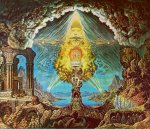evilbob
Explorer
I haven't read this thread, but my quick response is: of course. I don't know why it wouldn't be an option.Do we yet know if it's possible (RAW - every table will differ, of course) for a character to refuse to worship any deity in 5e?
I'm working on a warlock character, & I think he might be of the 'these beings are indeed powerful, but not truly 'gods' in the way that word is commonly used' bent - if permitted.
With the looser rules, is this just more likely to fall into an individual DM question?
As you said, every table will handle things differently, but there's no reason to think - rules-wise - this isn't a problem.



![Devious :] :]](http://www.enworld.org/forum/images/smilies/devious.png)